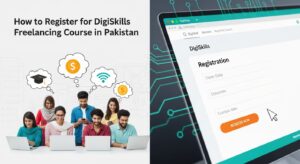In today’s fast-paced digital world, freelancing has emerged as a powerful pathway to financial independence and career growth, especially for the youth of Pakistan. The E-Rozgaar Program, a flagship initiative by the Punjab Information Technology Board (PITB) and the Youth Affairs & Sports Department, is at the forefront of empowering young graduates with essential digital skills to thrive in this exciting landscape. This guide will walk you through every step of enrolling in E-Rozgaar freelancing training in Pakistan, ensuring you have all the information you need to embark on your freelancing journey.
Whether you’re a fresh graduate looking for opportunities or someone keen to acquire new skills for online earning, E-Rozgaar offers a structured and supportive environment. It’s more than just training; it’s a stepping stone towards building a sustainable online career and contributing to Pakistan’s growing digital economy.
Understanding the E-Rozgaar Program
Before diving into the application process, it’s crucial to understand what E-Rozgaar is all about. This program was launched with a clear vision: to combat unemployment among Pakistani youth by equipping them with in-demand digital skills and the know-how to succeed as freelancers on various online platforms.
What is E-Rozgaar?
E-Rozgaar is a government-backed initiative that provides free or highly subsidized training in various digital skills, coupled with comprehensive guidance on freelancing. The program aims to make participants self-sufficient by enabling them to earn online, both locally and internationally, thereby boosting the country’s foreign exchange remittances.
Why Enroll in E-Rozgaar?
Enrolling in E-Rozgaar freelancing training offers numerous benefits. Firstly, it provides high-quality training from experienced instructors, often freelancers themselves, who understand the nuances of the online market. Secondly, the courses are designed to be practical and market-driven, focusing on skills that are currently in demand. Lastly, it connects you with a community of like-minded individuals and offers a credible certificate upon completion, which can be a significant advantage when building your online portfolio.
Step 1: Checking Your Eligibility for E-Rozgaar
The very first step to enrolling in E-Rozgaar freelancing training is to ensure you meet the program’s eligibility criteria. These criteria are put in place to ensure that the program reaches its intended beneficiaries and that participants can benefit fully from the training.
What are the Eligibility Criteria?
Generally, to be eligible for E-Rozgaar, you need to meet the following requirements:
- Domicile: You must hold a valid domicile of Punjab. While E-Rozgaar primarily focuses on Punjab, similar initiatives like the National Freelance Training Program (NFTP) might cater to other provinces. Always check the official website for any updates regarding nationwide eligibility.
- Education: You should have at least 16 years of education. This typically means a Bachelor’s degree or equivalent. Some specialized courses might have specific educational prerequisites, so it’s always good to verify for your chosen track.
- Age Limit: The typical age limit for applicants is up to 35 years. This may vary slightly, so confirm the current age limit on the E-Rozgaar website.
- Employment Status: Generally, E-Rozgaar targets unemployed or underemployed youth. This doesn’t mean you can’t apply if you have a part-time job, but the program is designed to help those seeking stable income opportunities.
- Valid CNIC/Form B: You must possess a valid Computerized National Identity Card (CNIC) or Form B if you are under 18. This is essential for verification purposes.
Why is Eligibility Important?
The eligibility criteria ensure that resources are allocated to individuals who are most likely to benefit and contribute to the program’s objectives. Meeting these requirements streamlines the application process and prevents your application from being rejected prematurely.
What if I Don’t Meet All Criteria?
If you don’t meet a specific criterion, such as the domicile requirement, don’t lose hope. Explore other government-backed initiatives like the National Freelance Training Program (NFTP) or provincial programs that might be available. These programs often have similar objectives and can provide valuable freelancing training opportunities across Pakistan.
Step 2: Choosing Your Training Domain
E-Rozgaar offers a variety of training domains, each focusing on different in-demand digital skills. Selecting the right domain is a critical decision that will shape your freelancing career path.
What are the Available Domains?
E-Rozgaar typically categorizes its courses into several key domains. While the exact courses offered can vary slightly with each batch and center, common domains include:
- Technical: This domain usually covers skills like Web Development (front-end and back-end), WordPress development, hybrid mobile app development, and sometimes even programming languages like Python.
- Content Marketing & Advertising: This domain focuses on skills such as content writing, Search Engine Optimization (SEO), social media marketing, email marketing, and digital advertising (Meta and Google Ads).
- Creative Design: This domain is for those interested in graphic design, UI/UX design, visual content creation, and often includes training in popular design software.
- E-commerce: This specialized domain focuses on setting up and managing online stores, often with platforms like Shopify, and covers aspects like product sourcing, marketing, and logistics.
- Freelancing Masterclass: While freelancing is taught as a compulsory component across all courses, some centers may offer a dedicated masterclass that delves deeper into platform usage, proposal writing, client communication, and payment methods.
Why is Choosing the Right Domain Important?
Your chosen domain will be the foundation of your freelancing career. It’s crucial to select a field that aligns with your interests, existing aptitudes, and long-term career goals. Choosing a domain you genuinely enjoy will make the learning process more engaging and increase your chances of success as a freelancer.
How to Choose the Best Domain for You
- Self-Assessment: Think about your existing skills, hobbies, and interests. Are you naturally artistic? Do you enjoy writing? Are you good with technology?
- Market Demand: Research which skills are currently in high demand on freelancing platforms. While E-Rozgaar courses are designed to be relevant, staying updated on market trends is always a good practice.
- Future Prospects: Consider the long-term growth potential of each domain. Digital skills are constantly evolving, so choose a field with good future prospects.
- Trial and Error (Initial): If you’re unsure, try some basic online tutorials or free courses in different areas to get a feel for them before committing to a specialized E-Rozgaar domain.
Step 3: The Online Application Process
Once you’ve confirmed your eligibility and decided on a domain, the next step is to complete the online application. This is a straightforward process, but attention to detail is key.
Where to Apply?
The official E-Rozgaar website is your primary portal for application. Be wary of unofficial sources or agents claiming to offer direct admissions. Always use the link provided on the official E-Rozgaar website, typically found under a “Apply Now” or “Sign-up” section.
Step-by-Step Application Guide
- Visit the Official Website: Navigate to the E-Rozgaar official portal.
- Locate the Sign-up/Apply Button: Find the prominent button or link that allows you to register for the program.
- Fill the Registration Form:
- Provide accurate personal details: Your full name, CNIC number, date of birth, contact number, and email address.
- Select your preferred training mode: E-Rozgaar typically offers both physical (in-center) and online training options. Choose the one that suits your convenience and learning style.
- Choose your desired training center (for physical training): If you opt for physical training, you’ll need to select a center from the list of available E-Rozgaar centers. These centers are often located in universities or other educational institutions across various cities in Punjab.
- Select your preferred course/domain: Based on your decision from Step 2, carefully select the domain you wish to specialize in. Be aware that once selected, changing your course, mode, or center might not be possible, or it could involve a lengthy process.
- Provide your educational qualifications and employment status.
- Submit the Form: Double-check all the information you’ve entered before submitting to avoid any discrepancies.
- Receive Login Details: After successful registration, you will usually receive an email and an SMS containing your login ID and password. Keep these details safe, as you’ll need them for the next step.
Common Mistakes to Avoid During Application
- Incorrect Information: Providing false or inaccurate information can lead to your application being rejected during the verification stage.
- Typographical Errors: A simple typo in your CNIC or email address can prevent you from receiving crucial updates or accessing your account.
- Ignoring Instructions: Read all instructions carefully. Missing a required field or not following specific guidelines can cause issues.
- Late Application: E-Rozgaar admissions often operate on a batch system. Missing the application deadline means you’ll have to wait for the next cycle.
Step 4: The Online Test
After registering and receiving your login details, the next crucial step is to attempt an online test. This test helps E-Rozgaar assess your basic aptitude and general knowledge, helping them filter candidates for the program.
What is the Online Test Like?
The E-Rozgaar online test is typically a multiple-choice questions (MCQs) based assessment. It usually covers:
- General Knowledge: Basic current affairs, history, and geography of Pakistan and the world.
- English Language: Grammar, vocabulary, and reading comprehension.
- Basic IT/Computer Knowledge: Fundamental concepts of computers, internet, and common software.
- Analytical/Logical Reasoning: Questions designed to assess your problem-solving abilities.
The test is usually timed, often around 30 minutes for 30 questions, so managing your time effectively is important.
Why is the Test Conducted?
The online test serves as an initial screening tool. It helps E-Rozgaar gauge your basic cognitive abilities and general awareness, ensuring that candidates possess a foundational understanding necessary to grasp the technical aspects of the training. It also helps in shortlisting candidates for the limited available seats.
How to Prepare for the Online Test
- Review Basic Concepts: Refresh your knowledge of general current affairs, basic English grammar, and fundamental computer concepts.
- Practice Online MCQs: Look for general knowledge and aptitude test MCQs online to familiarize yourself with the format and improve your speed.
- Ensure Stable Internet and Power: This is critical. The test has a strict time limit, and any disruption can cause you to lose access and fail the test. Have a reliable internet connection and a power backup (UPS/generator) ready.
- Attempt within the Time Limit: You typically have 72 hours from the time you receive your login details to attempt the online test. Do not delay, as your application will be considered null and void if you miss this window.
Step 5: Fee Submission and Document Verification
If you successfully pass the online test, you will be shortlisted. The next steps involve submitting the admission fee (if applicable) and undergoing document verification.
Admission Fees
While E-Rozgaar was initially free, some iterations or specific centers might now charge a nominal, subsidized fee. This fee is significantly lower than market rates for similar courses and helps ensure commitment from the participants. You will be informed of the exact fee and payment method (e.g., challan form) if you are shortlisted.
How to Submit the Fee
Typically, a challan form will be generated for you to download. This challan can usually be paid at designated banks (like HBL, Bank Alfalah, First Women Bank) or through mobile banking apps. Always ensure you keep the payment receipt as proof.
Document Verification
After fee submission, you will be required to verify your documents. This step is crucial to confirm the accuracy of the information you provided during the application.
What Documents Are Required?
- Original CNIC/Form B
- Original educational degrees/certificates (e.g., Bachelor’s degree, Intermediate certificate)
- Original domicile certificate
- Copy of the paid fee challan
- Passport-sized photographs (as specified)
Where and When to Verify Documents?
You will receive instructions via email or SMS regarding the date, time, and location for document verification. This usually takes place at the E-Rozgaar center you selected or a designated PITB office. It’s essential to attend this verification session with all your original documents.
Why are these Steps Important?
Fee submission solidifies your commitment to the program, while document verification ensures fairness and transparency in the selection process. It confirms that only eligible and genuine candidates are enrolled.
Step 6: Enrollment and Commencement of Training
Once your fee is paid and documents are verified, you will be officially enrolled in the E-Rozgaar freelancing training program.
Receiving Enrollment Confirmation
You will receive a confirmation message, often via email or SMS, notifying you of your successful enrollment. This message will also contain details about your batch, class schedule, and the commencement date of your training.
Attending the Training
Whether you opted for physical or online training, be prepared for an intensive learning experience. E-Rozgaar training programs are typically structured with a mix of theoretical knowledge and practical, hands-on exercises.
- Physical Training: Attend classes regularly at your chosen E-Rozgaar center. These centers usually offer well-equipped computer labs, high-speed internet, and a conducive learning environment. Engage with your instructors and fellow trainees.
- Online Training: Access your courses through the designated online learning platform. Ensure you have a stable internet connection and a quiet space to focus. Participate actively in online discussions and complete assignments.
Key Aspects of E-Rozgaar Training
- Duration: The duration of courses varies, but they typically range from 2 to 3 months, with a certain number of lecture hours.
- Curriculum: Each domain has a comprehensive curriculum designed to provide practical skills. For example, in the Web Development domain, you’ll learn HTML, CSS, JavaScript, and WordPress. In Content Marketing, you’ll cover content writing, SEO, and social media strategies.
- Freelancing Focus: A crucial part of every course is dedicated to freelancing. You’ll learn how to create profiles on platforms like Upwork and Fiverr, write compelling proposals, communicate with clients, and manage payments.
- Practical Assignments: Expect regular assignments and projects to apply what you’ve learned. These are vital for skill development and building your portfolio.
- Mentorship: Many E-Rozgaar centers and online programs offer access to experienced freelancers or trainers who can provide guidance and answer your queries.
Making the Most of Your Training
- Active Participation: Don’t just passively listen. Ask questions, participate in discussions, and complete all assignments diligently.
- Networking: Connect with your instructors and batch mates. This can lead to valuable collaborations and support networks in your freelancing journey.
- Practice, Practice, Practice: The more you practice the skills you learn, the more proficient you will become. Work on personal projects outside of class if possible.
- Build Your Portfolio: Start building a portfolio of your work as you learn. This will be essential when you begin applying for freelancing gigs.
- Stay Updated: The digital landscape changes rapidly. Continuously learn and adapt to new tools and trends even after your training ends.
Step 7: Post-Training Support and Freelancing Journey
Completing your E-Rozgaar freelancing training is a significant achievement, but it’s just the beginning of your freelancing career. E-Rozgaar often provides some post-training support to help you kickstart your earning journey.
Support After Training
Many E-Rozgaar centers and the program itself offer continued support, which might include:
- Alumni Networks: Access to exclusive online groups or forums where past graduates share experiences, tips, and even job opportunities.
- Mentorship Sessions: Occasional workshops or sessions with successful freelancers to guide you through initial challenges.
- Job Boards/Opportunities: Sometimes, E-Rozgaar centers might share freelancing opportunities or direct potential clients to their graduates.
- Certificate: You will receive a government-recognized certificate upon successful completion, which adds credibility to your profile.
Beginning Your Freelancing Career
Armed with your new skills and the confidence from E-Rozgaar freelancing training, it’s time to step into the world of online earning.
- Create Strong Profiles: Set up professional profiles on major freelancing platforms like Upwork, Fiverr, Freelancer.com, and PeoplePerHour. Optimize them with keywords relevant to your skills.
- Develop Your Portfolio: Showcase your best work from the E-Rozgaar training. Even practice projects can demonstrate your capabilities.
- Craft Winning Proposals/Gigs: Learn to write compelling proposals that highlight your understanding of the client’s needs and how you can provide value. For Fiverr, create attractive gigs that clearly define your service offerings.
- Start Small, Build Reputation: Don’t be afraid to take on smaller projects initially, even if they don’t pay much. The goal is to accumulate positive reviews and build your reputation.
- Communicate Effectively: Clear and timely communication with clients is paramount for success in freelancing.
- Manage Your Finances: Learn about different payment methods available in Pakistan for receiving international payments and how to manage your earnings.
- Continuously Learn: The freelancing world is dynamic. Stay updated on new tools, trends, and strategies in your chosen domain.
Anticipating Challenges and Offering Advice
While E-Rozgaar freelancing training provides an excellent foundation, the journey to becoming a successful freelancer can have its hurdles. Being prepared for these challenges can make a significant difference.
Common Challenges
- Initial Struggle for Clients: It can take time to land your first few clients. Don’t get discouraged if success isn’t immediate.
- Competition: The freelancing market is competitive. You’ll need to stand out with your skills and professionalism.
- Scams: Be wary of fraudulent clients or offers that seem too good to be true. Always use established freelancing platforms for secure transactions.
- Payment Issues: Understand the different international payment gateways and potential challenges with receiving funds in Pakistan.
- Time Management and Discipline: Freelancing requires self-discipline to manage your time, meet deadlines, and balance multiple projects.
- Skill Obsolescence: Digital skills evolve rapidly. What’s in demand today might be less so tomorrow.
Helpful Advice for Freelancers in Pakistan
- Specialize: While E-Rozgaar gives you a broad base, consider specializing in a niche area within your chosen domain. This can help you become an expert and attract higher-paying clients.
- Build a Strong Portfolio: Even before landing your first paid gig, create sample projects that showcase your skills. This is your resume in the freelancing world.
- Learn to Market Yourself: Understand personal branding and how to effectively present yourself on freelancing platforms and social media.
- Network: Engage with other freelancers, join online communities, and attend local meetups (if available). Networking can lead to collaborations and referrals.
- Invest in Tools: As you grow, consider investing in professional tools and software that can enhance your efficiency and service quality.
- Financial Planning: Learn to manage your freelance income. Consider setting aside funds for taxes and reinvesting in your skills.
- Stay Patient and Persistent: Success in freelancing doesn’t happen overnight. Consistent effort, continuous learning, and persistence are key.
Conclusion
Enrolling in E-Rozgaar freelancing training in Pakistan is a commendable step towards building a brighter future. By understanding the eligibility criteria, carefully selecting your training domain, meticulously following the application process, and dedicating yourself to learning, you can unlock a world of opportunities in the digital economy. Remember, E-Rozgaar provides the tools and knowledge, but your success will ultimately depend on your commitment, hard work, and continuous adaptation to the dynamic freelancing landscape. Embrace this journey, and you’ll be well on your way to becoming a successful Pakistani freelancer.










